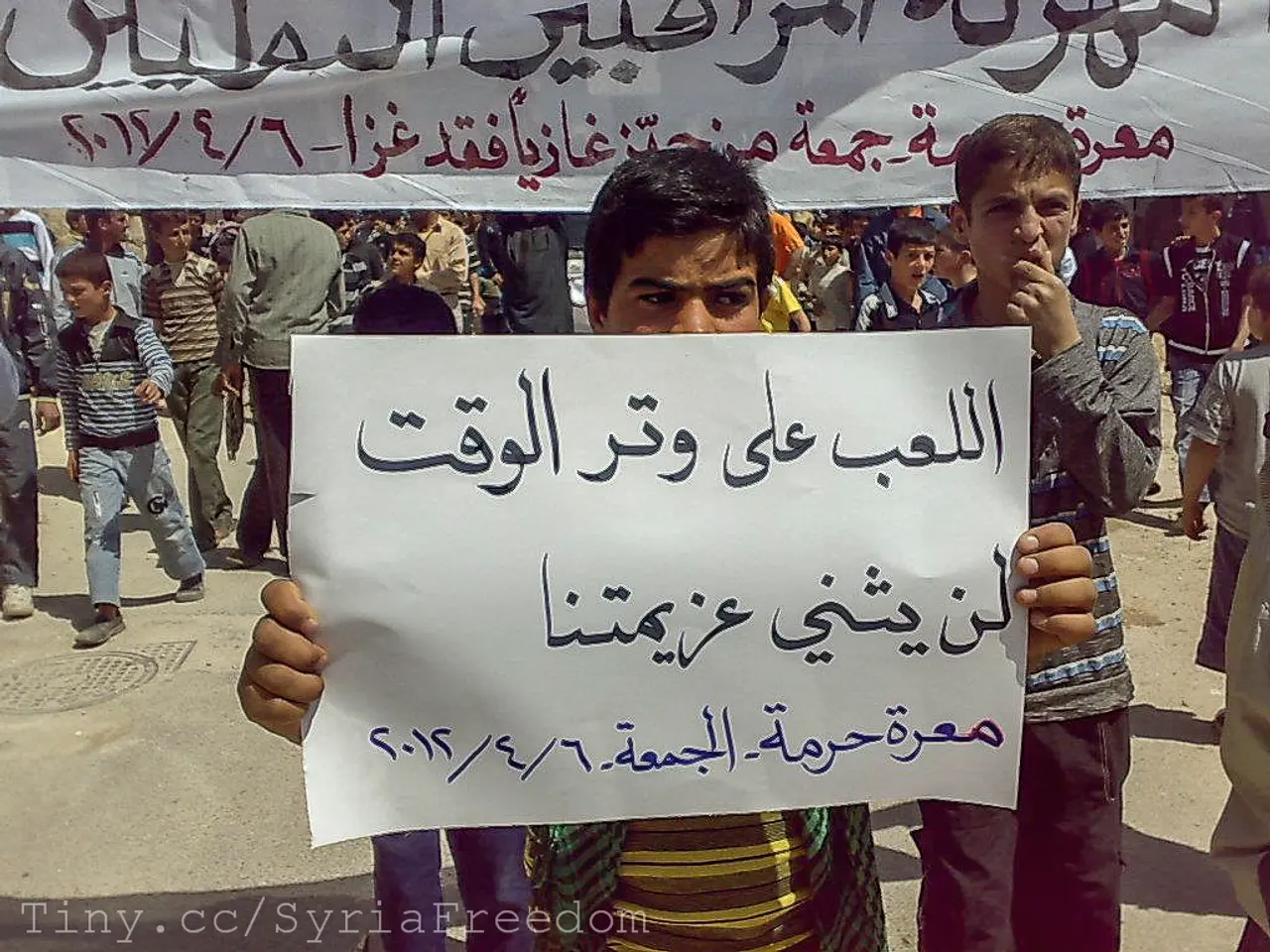Military ambitions in Gaza City trigger concerns among civilians and captives
The U.S. administration has been briefed on a new framework for Israel's ongoing conflict with Hamas, which includes plans to seize control of Gaza City. This escalation, approved by Israel's military leadership on August 13, 2025, aims to demilitarize the region and remove Hamas from power.
The plan, which calls for the forced evacuation of about one million Palestinian residents of Gaza City, has raised grave concerns both domestically and internationally. The operation, expected to be "gradual" with no confirmed start date, could displace tens of thousands of people and further disrupt humanitarian aid efforts in the hunger-stricken territory.
Israel's military chief of staff, Lt. Gen. Eyal Zamir, has warned that expanding operations could endanger the remaining 20 or so living hostages held by Hamas and further strain Israel's army after nearly two years of regional wars. Families of hostages held by Hamas criticize the plan as a potential death sentence for their loved ones, fearing the intensification of fighting in urban areas where hostages are believed to be held.
The UN and other international bodies warn that this plan risks catastrophic civilian displacement and suffering. The UN Security Council has scheduled an emergency meeting on Sunday at 10 a.m. EDT to discuss the matter.
The framework for ending the conflict in Gaza involves a Palestinian-Arab committee running Gaza and overseeing reconstruction, with a new police force trained by two U.S. allies in the Middle East taking over the strip. However, the role of the Western-backed Palestinian Authority in the framework is unclear.
The new plan may be aimed at pressuring Hamas to accept a ceasefire on Israel's terms. Hamas has rejected Israel's plans, and a senior Hamas official has yet to receive details on the latest efforts to revive ceasefire talks. Egypt and Qatar are preparing a new framework for the release of all hostages in one go, in return for an end of the war in Gaza and the withdrawal of Israeli forces from the strip.
This military escalation follows Israel's announcement in early August 2025, which calls for the forced evacuation of about one million Palestinian residents of Gaza City over the next two months. After evacuation, the IDF plans to move in and capture Gaza City and the remaining part of the Gaza Strip not yet under Israeli control. This operation is expected to disarm Hamas, establish Israeli security control, and install a civilian administration that is neither Hamas nor the Palestinian Authority.
The framework also addresses the issue of Hamas' weapons, with discussions about "freezing arms," which may involve Hamas retaining but not using its weapons. However, the details of this are yet to be clarified.
The efforts for a new ceasefire have the backing of major Arab Gulf monarchies, concerned about further regional destabilization if Israel fully reoccupies Gaza. Internationally, the UN Secretary-General and other officials have expressed grave concern, calling for an immediate ceasefire, unimpeded humanitarian access, and the unconditional release of hostages. The UN also reminds Israel of its obligations under international law, opposing new settlement activities and advocating against permanent occupation of Gaza.
This conflict has already taken a heavy toll on the Palestinians, with the UN's figures showing over 61,000 Palestinians having been killed according to Gaza's Health Ministry. The UN and independent experts view these figures as the most reliable estimate of casualties during the conflict.
The situation remains tense, with at least six Palestinians shot dead and more than 140 wounded at the Israeli-run Zikim Crossing in northern Gaza on Friday. The international community continues to watch closely as this situation unfolds, hoping for a peaceful resolution that prioritizes the safety and wellbeing of all those affected.
[1] The New York Times. (2025, August 14). Israel Approves Plan to Take Over Gaza City. Retrieved from https://www.nytimes.com/2025/08/14/world/middleeast/israel-gaza-city-plan.html [2] The Guardian. (2025, August 15). Israel's Plan to Take Over Gaza City Sparks International Concern. Retrieved from https://www.theguardian.com/world/2025/aug/15/israels-plan-to-take-over-gaza-city-sparks-international-concern [3] Al Jazeera. (2025, August 16). UN Calls for Immediate Ceasefire in Gaza. Retrieved from https://www.aljazeera.com/news/2025/08/16/un-calls-for-immediate-ceasefire-in-gaza [4] Reuters. (2025, August 17). UN Reminds Israel of Obligations under International Law. Retrieved from https://www.reuters.com/world/middle-east/un-reminds-israel-obligations-under-international-law-2025-08-17/ [5] BBC News. (2025, August 18). Families of Hostages Fear for Loved Ones in Gaza. Retrieved from https://www.bbc.co.uk/news/world-middle-east-57963647
- The international community, including the UN, major Arab Gulf monarchies, and news outlets such as The New York Times, The Guardian, Al Jazeera, Reuters, and BBC News, have expressed grave concerns about Israel's plan to seize control of Gaza City, citing potential displacement of Palestinians, strain on humanitarian aid efforts, and escalation of conflict.
- The business sector in Seattle, Washington, and other cities around the world, may be impacted by this escalating conflict in Gaza as the uncertain political climate in the region can affect investment and trade opportunities. Additionally, the potential humanitarian crisis may lead to increased aid requests and calls for corporate social responsibility from businesses worldwide.
- Despite the ongoing conflict between Israel and Hamas, negotiations for a ceasefire and the release of hostages continue behind the scenes. Diplomats from Egypt and Qatar have reportedly been discussing a new framework that would involve the unconditional release of all hostages in return for an end to the war and the withdrawal of Israeli forces from Gaza. This possible peace agreement could influence political discussions and decisions at various levels, including local and national governments, businesses, and nongovernmental organizations.







